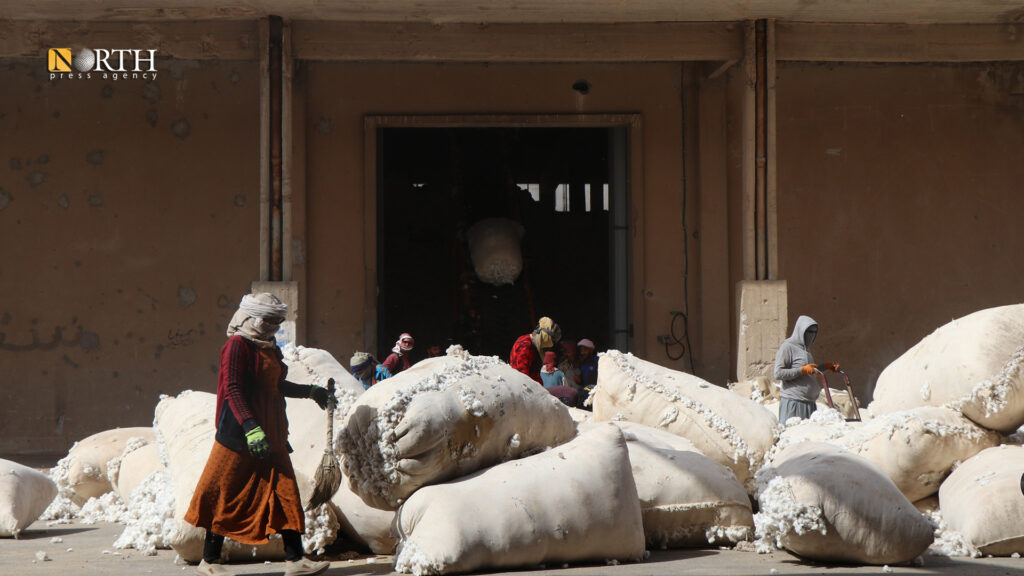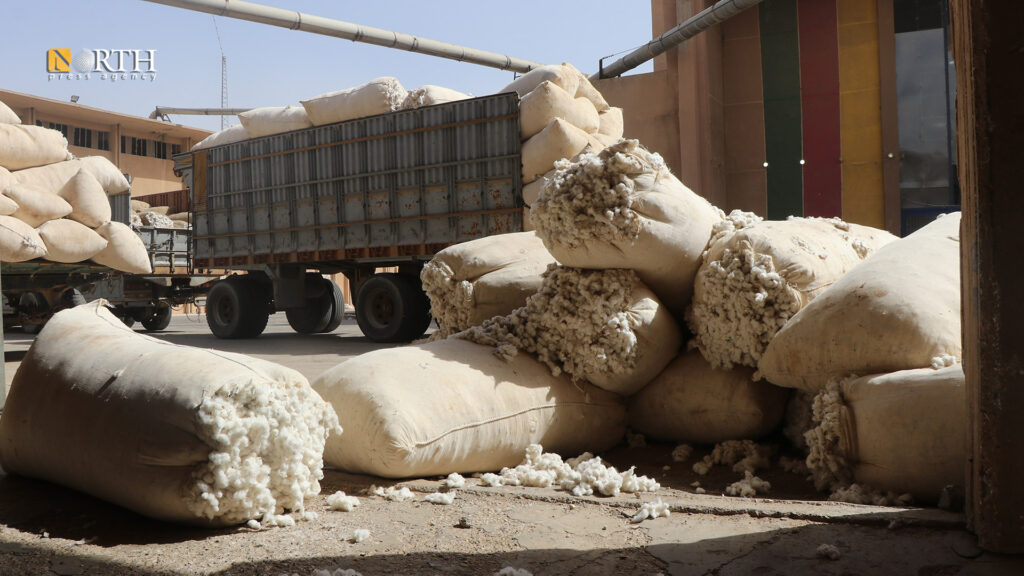HASAKAH, Syria (North Press) – 64-year-old Salem al-Ali, from Tel Brak north of Hasakah, has not received but five batches of diesel out of allotted 15 rations.
he said with dismay traders have diesel while farmers cannot obtain it.
The farmer had sown 25 acres of cotton this year. He bought 12 barrels of diesel on the black market in return for 3 million Syrian pounds (SYP, equals about $560).
Al-Ali has spent an estimated 7 million SYP (about $1.300) as cultivation costs, while he sold the production at 12 million SYP (about $2.200).
Farmers in Hasakah complain about not receiving their rations of diesel for this year that compelled them to buy it on the black market to in order for the crops not to get damaged.
All this added more costs and reduced profits of some while others were afflicted with heavy losses as each liter of diesel is sold in return for 450-1200 SYP.

Data by Agriculture and Irrigation Board of the Autonomous Administration of North and East Syria (AANES) reveals that 500.000 acres have been cultivated with cotton in northeast Syria this year.
In Hasakah and its countryside, 12.000 acres were cultivated with cotton, according to the Agriculture Directorate of Hasakah.
The AANES set the price of a kilo of cotton at 4.300 SYP for the best quality and 3.850 for the lowest.
Who bears responsibility?
36-year-old Abdulbaset Sayyed, a farmer from Tel Tamr, north of Hasakah, says the set price for cotton is not proportionate with the costs. Sayyed like many others was compelled to buy diesel on the black market.
Sayyed, who cultivated 35 acres with cotton, said the crop needs to be watered one time every eight days, however, in common with others, he used to irrigate his field once every 13 days to save diesel.
He received just six batches of diesel out of 12 allotted to his fields, forcing him to buy his needs on the black market at 3 million SYP.
He also paid other costs estimated at 20 million SYP ($3.770) for securing insecticides, fertilizers, seeds, plowing, shipping added to breakdowns in the generator.
Sayyed’s field produced nearly 8 tons and 750 kilograms, costing 30 million SYP ($5.550).
However, Fuel Directorate told North Press they deliver diesel according to lists sent to them by the directorate and board of agriculture including amounts and batches to be delivered.
The Fuel Directorate said their mission is only to put into action the distribution processes.

Contacting the Agriculture Directorate in Hasakah and the Agriculture Board in northeast Syria, officials said they have nothing to do with lack of diesel and the reduced number of batches, adding it is the responsibility of the Fuel Directorate.
However, the Directorate said they file lists according to availability or non-availability of fuels, adding famers have received 7-8 batches of diesel.
The vast majority of farmers affirmed they received 5-6 batches.
Millions spent on diesel
The AANES activated three centers for farmers to ship cotton to in Hasakah, Deir ez-Zor and Raqqa.
According to Mahmoud Muhammad, an administrator in Hasakah cotton gin, the center receives 800-900 tons of cotton on a daily bases.
Awwad’s losses for this season are estimated at 6 million SYP ($1.130) he paid to buy seeds, diesel in addition to plowing costs. He gained nothing because his crop was reduced to ashes.
The 31-year-old Awwad al-Salem, from Markada, south of Hasakah, had sown 40 acres with cotton.
Since al-salem did not receive all his allotted rations, he was forced to buy diesel on the black market thus his losses doubled.
Al- Salem did receive but 3 out of 15 batches of diesel each contained 20 liter.
He bought nearly six barrels of diesel (each barrel contains 200 liters) in return for 1 million and a half on the market. However, he could not sustainably buy diesel and consequently his field was reduced to ashes, he told North Press.
40-year-old Abdulrazaq al-Iwayed, a farmer from Tel Hamis spent 230 million SYP ($43.390) as costs for plowing, picking, irrigation, fertilizers, oils, insecticides and breakdowns. He paid 160 million ($30.190) as costs for diesel he bought on the black market.
Al- Iwayed indicated his 400 acres produced 60 tons that was sold at 250 million SYP ($47.170).

